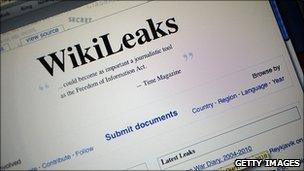Intelligence experts weigh the impact of Afghan Wikileaks revelations
- Published

Wikileaks may have many more documents on Afghanistan and Iraq
The Wikileaks disclosures have offered an unprecedented new view of war. But do they offer more clarity or fog?
They have certainly fuelled a raging debate.
There is also the security fall-out of the leak itself.
And a former CIA director has told the BBC that the shift to sharing intelligence after the 11 September, 2001, attacks in the US made such a leak inevitable.
The scale is certainly extraordinary and historic. But there may be an even more vast collection of leaked documents still to be published.
"We know Wikileaks has another 15,000 records from the Afghan war logs," says Kevin Poulsen of Wired.com.
"We think they may have another 500,000 records from the Iraq war from the same period 2004 through 2009, and they may also have 260,000 State Department diplomatic cables."
Suspicion for the leaks has fallen on US Army Private First Class (Pfc) Bradley Manning, an intelligence analyst who is now being held at the Quantico US Marine Corps base in Virginia.
He is there because he is already charged with leaking a controversial US military video from Iraq and downloading other documents.
'Vast treasure trove'
But many intelligence experts also suspect another culprit - the post-9/11 push to share more intelligence within the security and military system, to prevent a repeat of the failures then to "join up the dots".
That has given many more military and intelligence operatives access to vastly more information.
According to Gen Michael Hayden, former director of both the CIA and the US National Security Agency, "most of us knew, although this was a good idea, that it empowered our military and security forces, that sooner or later someone was going to take advantage of this vast treasure trove of information".
Much of the focus of cyber security has been on blocking attacks from outside.
But - whoever the actual leaker was - this episode is a reminder that the inside job may be at least as much of a security threat.
In the history of secrets, it was ever thus. But it is technology and the scale of information available that have changed.
As Gen Hayden puts it: "In a sense we knew we had removed all of the watertight doors from this ship so that if it did have a leak, the leak would be very severe."
Yet the failed Detroit airliner bombing in 2009 showed that US intelligence still struggles to join up the dots.
Some critics also argue that, despite the volume of raw information revealed by the Wikileaks war log, US military intelligence awareness on the ground in Afghanistan remains poor.
Electronic checks
So, in both cases, putting back the internal barriers to the flow of information in the system does not seem to be the answer.
There is no going back in that sense. As the US Secretary of Defense, Robert Gates, told US television, "if one or a few members of the military did this, the notion that we would handicap our soldiers on the front lines by denying them information in an effort to try and prevent this from happening - my bias is against that."
One answer, according to Gen Hayden, is simply to have better electronic checks on what authorised operatives are up to.
"What we need to do is frankly use better counter-intelligence tools, to be more aware of what's going on in our network," he said.
"The kinds of things that my credit card company responds to when my credit card is used in an unusual place - it almost automatically sends a warning flag. Well, we probably need more of those kinds of systems inside this classified network."
However, some experts question whether that is technically possible.
Of course, there is also a debate over whether what happened amounts to a security threat, or was an exercise in enforced transparency to prevent cover-ups.
Some analysts fear that the intelligence establishment will call for an increased clamp-down on secrecy.
But the data dump has also spurred those arguing that it shows that the US government needs to move more quickly to reduce the amount of information it classifies as secret, much of which - it is argued - is unnecessary.
According to Steven Aftergood, who runs the government secrecy programme at the Federation of American Scientists, which promotes public access to government information, "one of the lessons to be learned here is that it is time to rethink and revise our classification policy in the direction of greater discrimination.
"The scope of the secrecy system needs to be reduced, so that everything that gets classified really needs to be."
But as far as the military and intelligence communities' desire to keep secrets is concerned, there does seem to be a balance between security of the system and freedom of information within it to allow the analysts to work effectively.
"I think we'll make this more difficult to do," says General Hayden of the leaks. "But I would be the last to claim that this will never happen again. That's always a danger."
- Published10 August 2010
- Published6 August 2010
- Published27 July 2010
- Published26 July 2010
- Published26 July 2010
- Published7 December 2010